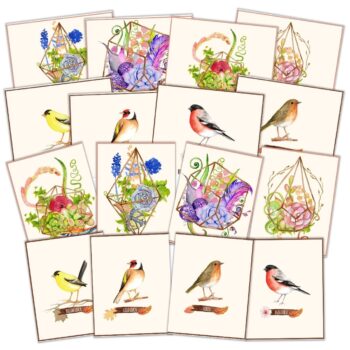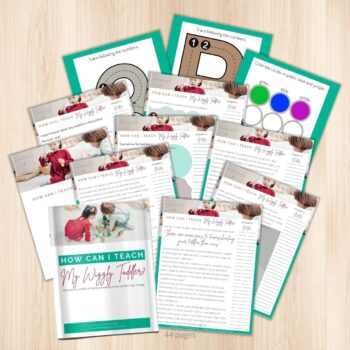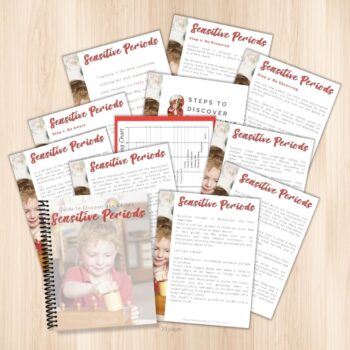Incorporating Montessori activities into your baby’s daily routine can be a rewarding and enriching experience, both for your child and for you as a parent. Learning how to start doing Montessori with your baby is easier than you think.
One of the first steps to creating a Montessori-friendly environment is to designate a safe, organized space where your baby can explore freely. This involves using low shelves for toys and materials, allowing your baby to choose and return items independently, fostering their sense of choice and responsibility.
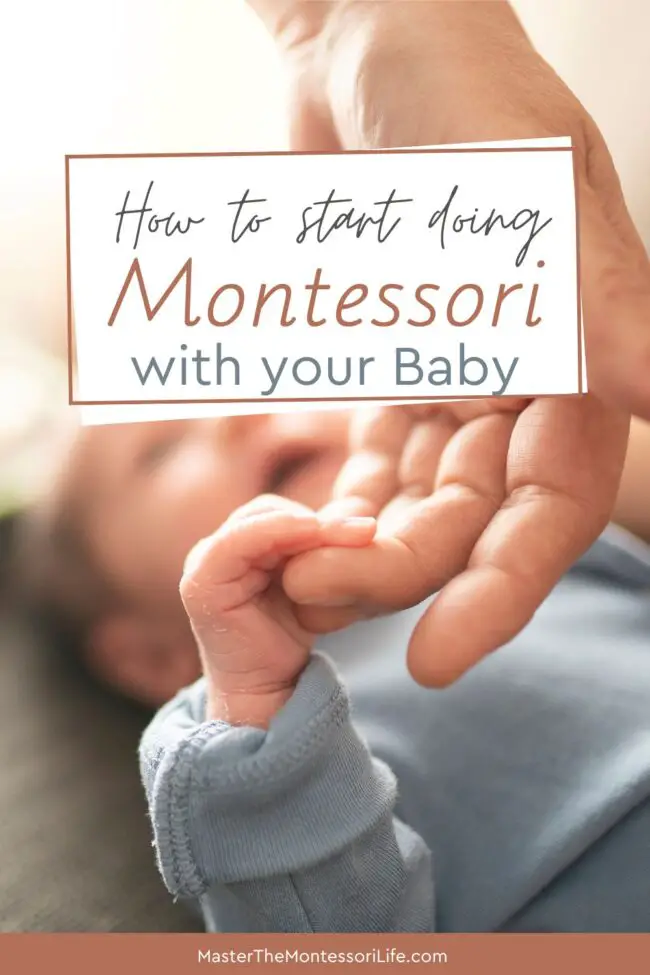
Important Elements
Another critical element is the use of floor beds instead of cribs, which promotes freedom of movement. This setup empowers your baby to explore their surroundings safely and fosters a sense of independence from an early age.
Selecting simple, natural toys made from materials like wood and fabric is also important, as these provide valuable sensory experiences and are generally safer for young children. Additionally, rotating these toys every few weeks keeps your baby engaged and stimulates deeper play with each item.

Nurturing your Montessori Baby Digital Book
$9.99
This digital book has 60 pages. Chapters:
- Why We Love Montessori at Home
- A Comprehensive Guide for New Parents
- Montessori for Infants: Why Start from Day One
- Fostering Independence from Birth
- Why Montessori Matters from Birth: The Impact on Infant Development
- Transitioning Your Nursery the Montessori Way
- 10 Essential Montessori Toys for Your Baby’s First Year
- Baby’s First Year: Applying Montessori Principles at Home
- Embracing Montessori Philosophy from Birth: An Age-by-Age Guide
- How to Incorporate Montessori Activities into Your Baby’s Daily Routine
Note: All blue underlined text is clickable when this digital book is opened with a computer.
EU buyers, GO HERE.
Observation is key in the Montessori method. Follow your baby’s lead and let their interests guide their playtime activities. This respectful approach to their curiosity promotes a love for learning. Including your baby in practical life activities, such as sorting laundry or setting the table, teaches valuable life skills and enhances motor development.
Promoting independence can also be achieved through self-feeding practices. Encouraging your baby to feed themselves using child-sized utensils not only improves hand-eye coordination but also builds confidence. Sensory exploration is another essential component, offering activities like playing with water, sand, or clay to support cognitive development and fine motor skills.
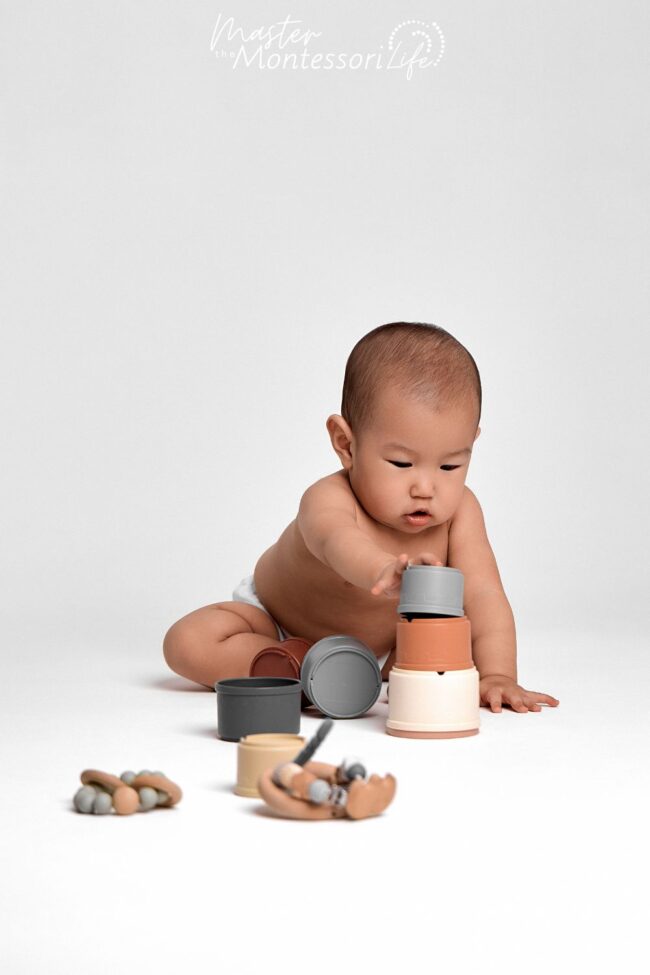
Introducing New Things
Child-sized furniture is highly recommended, as it allows your baby to interact more comfortably and independently with their environment. Outdoor play is equally crucial; spending time in nature enriches sensory experiences and provides diverse learning opportunities. Reading together daily, practicing language development, and introducing music and rhythm further stimulate auditory and verbal skills.
Movement and physical activity are vital for your baby’s overall development. Providing ample space and opportunities for crawling, climbing, and exploring encourages physical growth. Mirrors can be used for self-discovery, helping babies develop self-awareness and body coordination.

Incorporating art projects and messy play offers tactile experiences essential for sensory development and creativity. Establishing consistent routines provides a sense of security and predictability, aiding in your baby’s emotional and psychological development. Modeling positive behavior and celebrating your baby’s efforts and milestones with positive reinforcement encourages continued exploration and learning.
Consistency is Key
Ultimately, adopting these Montessori principles into your everyday life involves small, intentional changes that create a nurturing environment rich in learning opportunities. Observing and following your baby’s interests, you can provide meaningful experiences that support their natural development, fostering a lifelong love for learning.
You might also enjoy these relevant topics:
Montessori Wooden Baby Toy Set – 6 Pieces of Rattles, Push Car and Newborn Toys for PgUp Baby Play Gym Wooden Baby Gym with 7 Toys, Foldable Wooden Play Gym Frame Hanging
PgUp Baby Play Gym Wooden Baby Gym with 7 Toys, Foldable Wooden Play Gym Frame Hanging hahaland High Contrast Baby Flashcards – Black and White Infant Baby Cards 0-6 Months Tummy Time
hahaland High Contrast Baby Flashcards – Black and White Infant Baby Cards 0-6 Months Tummy Time MORITECK Spinning Drum, Montessori Toys for Babies 6-12 Months, Infant Kids Developmental Wooden Toy for Boy
MORITECK Spinning Drum, Montessori Toys for Babies 6-12 Months, Infant Kids Developmental Wooden Toy for Boy Montessori Play Kit for 0-6 Month Baby Tummy Time Interactive Toys Baby Brain Development Toys Rattle
Montessori Play Kit for 0-6 Month Baby Tummy Time Interactive Toys Baby Brain Development Toys Rattle Montessori Babies
Montessori Babies
- The First Year of Life: Developmental Stages and Key Milestones
 When you are looking at raising your baby the Montessori way, the first thing you need to focus on is the baby’s developmental stages during the first year of life.
When you are looking at raising your baby the Montessori way, the first thing you need to focus on is the baby’s developmental stages during the first year of life. - A Thorough Guide to Montessori Sight Words
 One of the core components of the Montessori literacy program is the introduction of sight words. But what exactly are Montessori sight words, and why are they important?
One of the core components of the Montessori literacy program is the introduction of sight words. But what exactly are Montessori sight words, and why are they important? - Benefits of Montessori Education
 Let’s discuss the benefits of Montessori education in this post because there is much to cover in this topic alone.
Let’s discuss the benefits of Montessori education in this post because there is much to cover in this topic alone.



